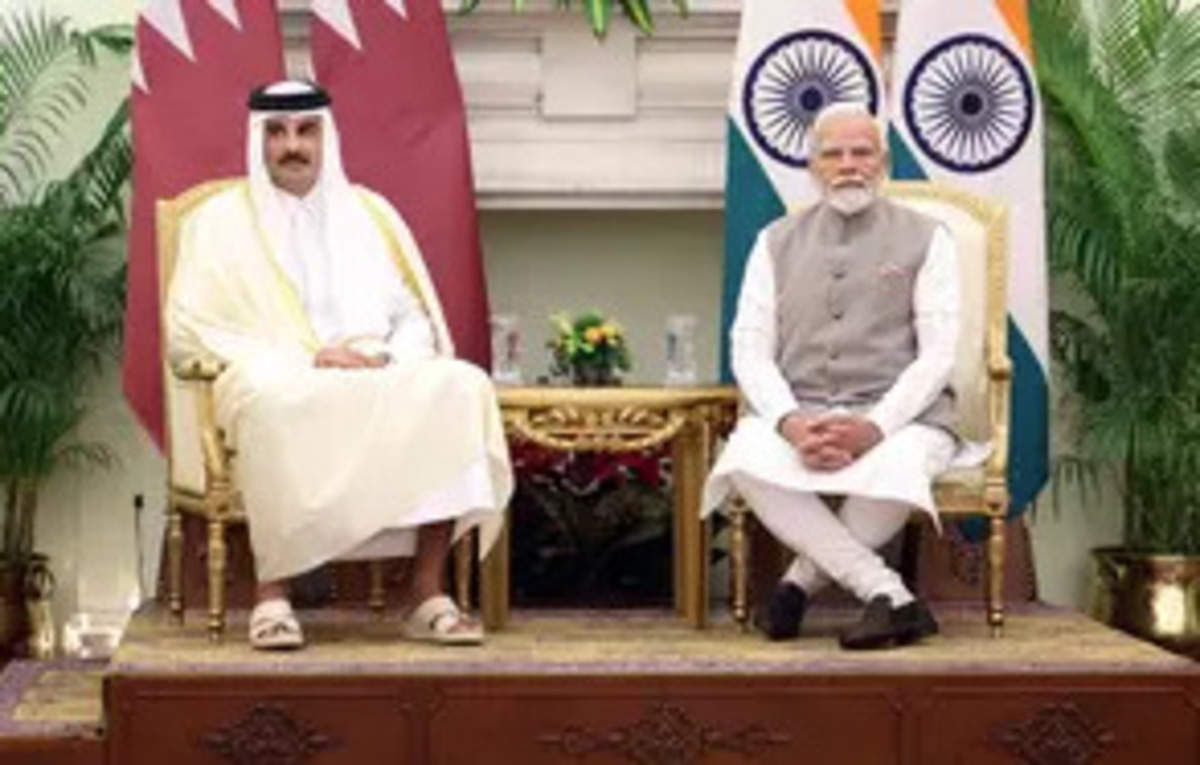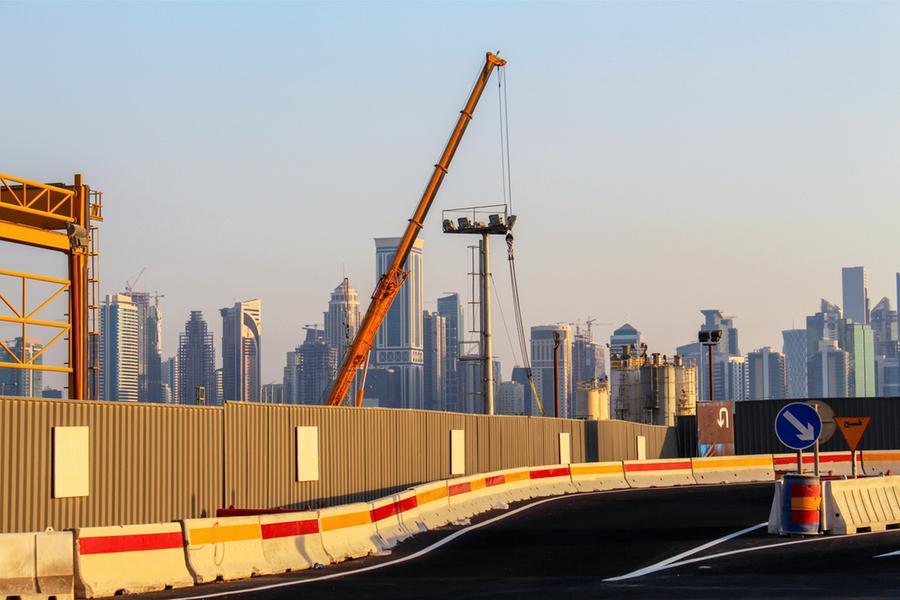Israel’s war on Gaza – six relentless months of death and destruction
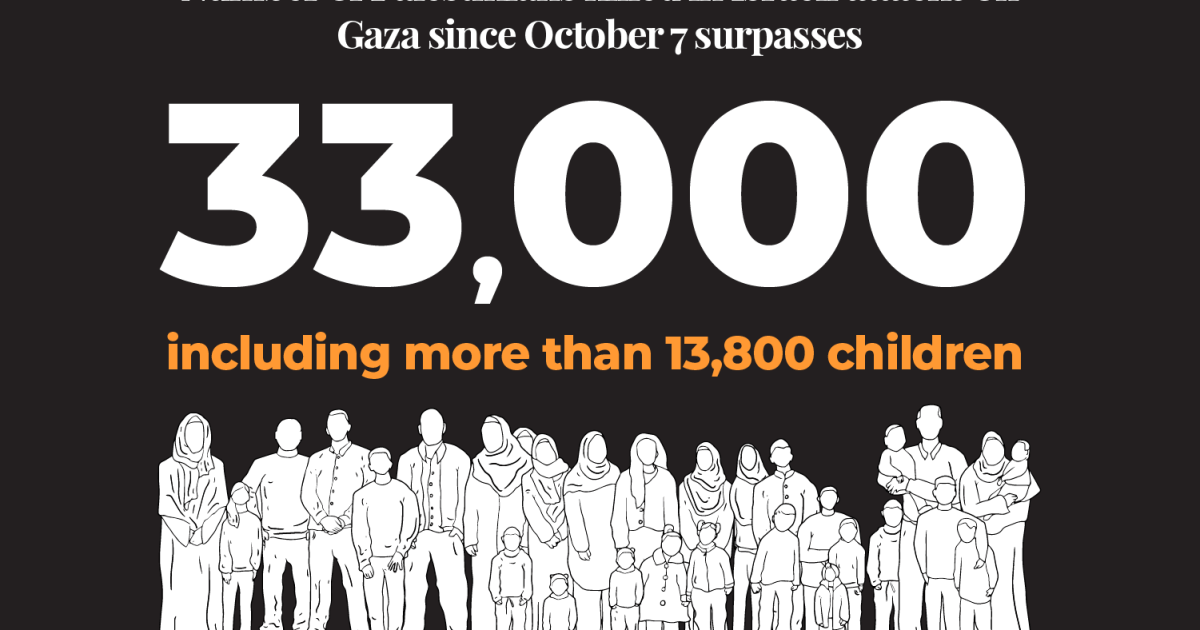
It has been six months since Israel launched its brutal assault on the Gaza Strip on October 7.
Israel shows no sign of stopping, as its allies continue to provide it with more weapons to use on Palestinians along with political support, and mediated talks have not led to a ceasefire.
The war on Gaza, Israel says, is in retaliation for attacks on Israeli territory by armed groups, led by Hamas’s Qassam Brigades, from Gaza which killed 1,139 people and took about 250 captive.
Let’s take a look at the toll the Israeli attacks have taken on Gaza.
How many people have been killed or injured?
At least 33,137 Palestinians have been killed by the Israeli army in Gaza since the start of the war on October 7, the Ministry of Health in Gaza says.
Thousands more are missing under the rubble of collapsed buildings and infrastructure, and are presumed dead.
Children and women comprise the overwhelming majority of those killed, with Save the Children saying more than 13,800 children have been killed.
UNICEF, the United Nations fund for children, estimated that at least 17,000 Palestinian children are currently unaccompanied or separated from their parents in Gaza.
At least 75,815 people have been injured in Israeli attacks since the start of the war – about four out of every 100 people in Gaza.
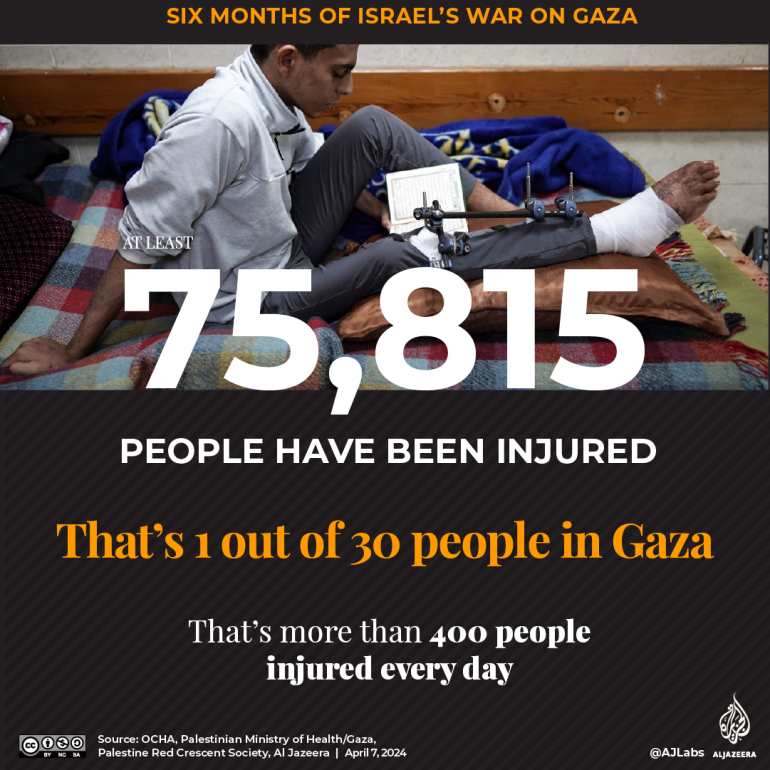
The Palestine Red Crescent Society said this week that some 1,000 children in Gaza have lost one or both of their legs.
Dozens of people are still killed and injured every day amid relentless Israeli attacks.
Are people starving?
The humanitarian situation in Gaza has grown significantly worse in 2024 as the Israeli army blocks the arrival of aid and has effectively imposed starvation as a weapon of war.
Nearly all 2.3 million people trapped in Gaza now face starvation, with the UN saying famine will take hold in various parts of Gaza by May.
Northern Gaza, which was the first to be decimated by an Israeli ground invasion, is the worst-hit – Israel continues to severely restrict access to the north, blocking routes and subjecting aid convoys to delays or cancellations.
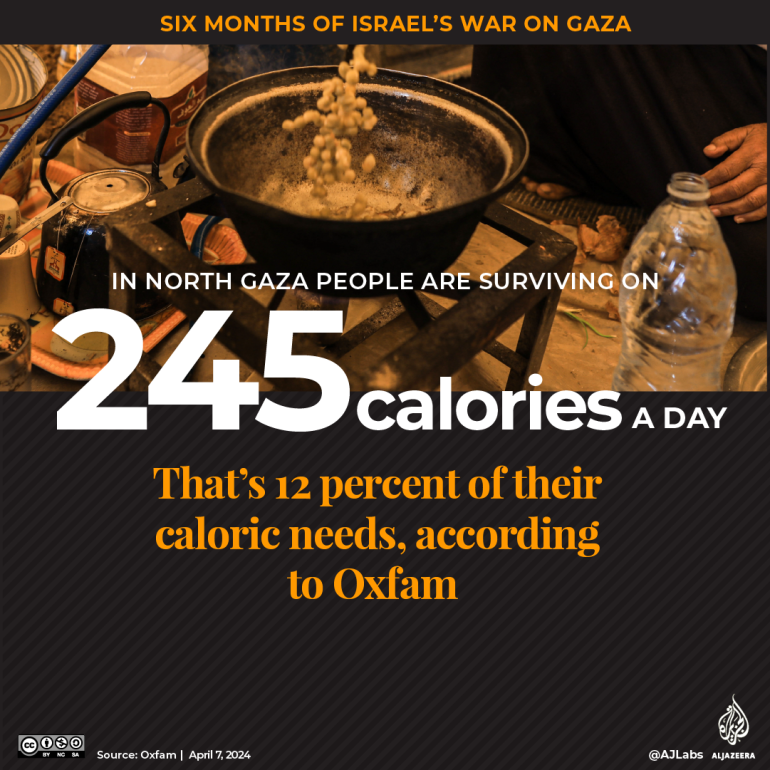
Babies and young children have died from dehydration and malnutrition in northern Gaza, but Israel is still blocking many humanitarian missions.
Last week, Israeli forces deliberately killed seven foreign aid workers in three targeted, consecutive strikes on a convoy of cars over a stretch of 2.3km (1.4 miles), prompting some aid organisations to suspend services.
How many people have been displaced?
The Israeli military ordered Palestinians to “go south” from the start of the war as its ground forces invaded Gaza from the north.
Nobody has been able to return to their homes in northern Gaza since then as Israel has established a military corridor cutting the Strip in half.
Some 1.9 million people, or more than 80 percent of Gaza’s population, have been internally displaced. Most are sheltering in UN installations such as schools and hospitals, nevertheless, more than 400 have been killed and at least 1,400 injured in those places.
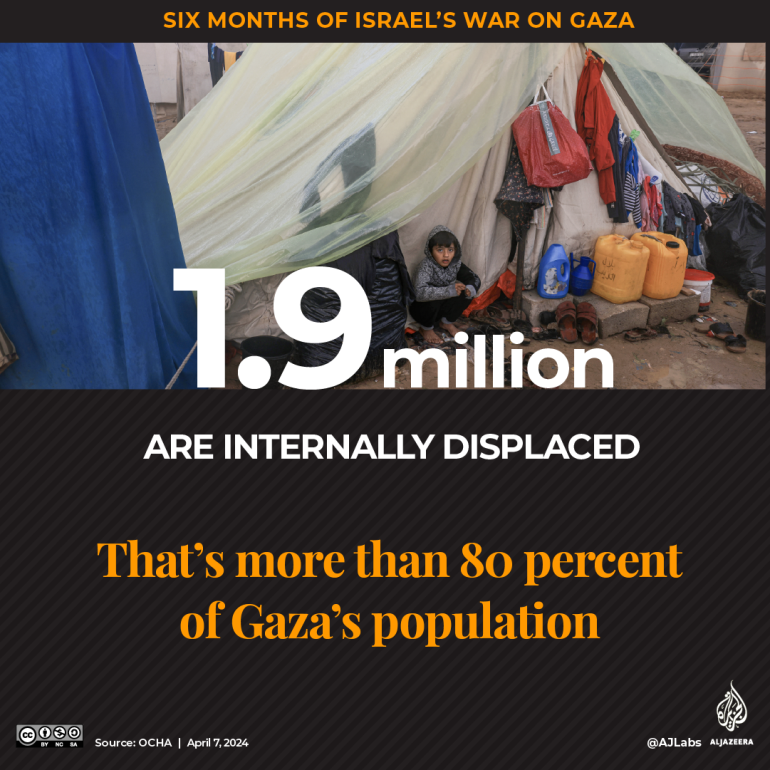
More than 1.5 million people are now crammed into Rafah, Gaza’s southernmost city on the border with Egypt. Many have been forced to stay in makeshift camps or the streets, exposed to Israeli air attacks.
Israel has insisted it will invade Rafah by land as well.
The UN agency for Palestinian refugees (UNRWA) says more than 350 Israeli military attacks have targeted its buildings, with 161 installations damaged. The highest number of UN staff in history – 176 – have been killed in Gaza since October 7.
How much of Gaza is in ruins?
The war has damaged or destroyed approximately 62 percent of all homes in Gaza – 290,820 housing units – leaving more than a million people without homes.
The $18.5bn in damage estimated by the World Bank and the UN has also been to public service infrastructure, with 26 million tonnes of debris and rubble left by the destruction.
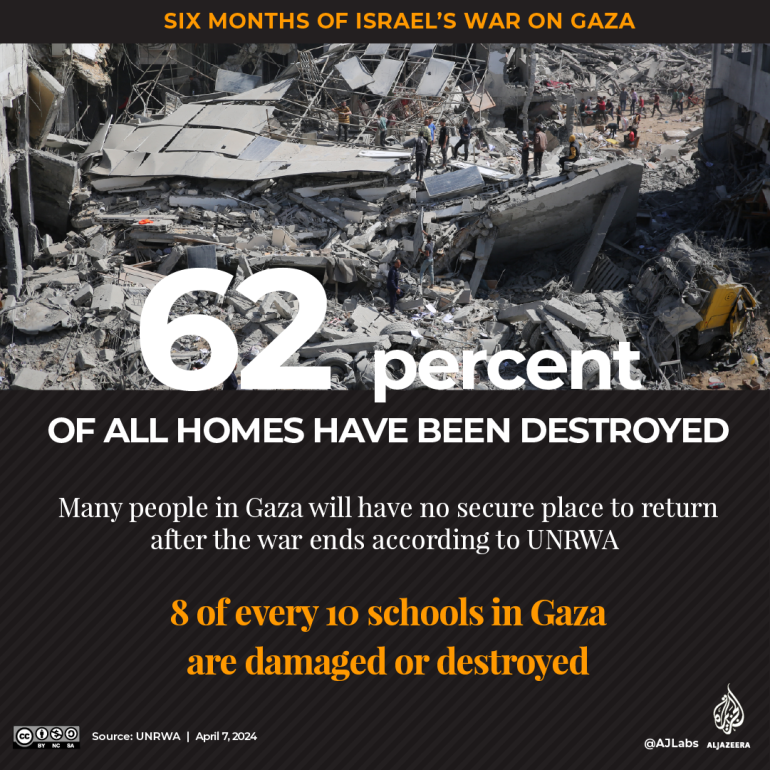
Damage has been most extensive in Khan Younis in southern Gaza, where Israeli ground and air attacks destroyed thousands of homes and infrastructure in a stated effort to combat “terrorists”.
Eight of every 10 schools in Gaza are damaged or destroyed, according to UNICEF. As many as 625,000 students have no access to education.
Are hospitals functioning?
The Israeli army has focused its attacks on hospitals across Gaza despite their protection under international law, claiming Hamas is operating within and underneath them.
All hospitals have suffered critical damage, with only 10 out of 36 able to function partially but they are increasingly overburdened.
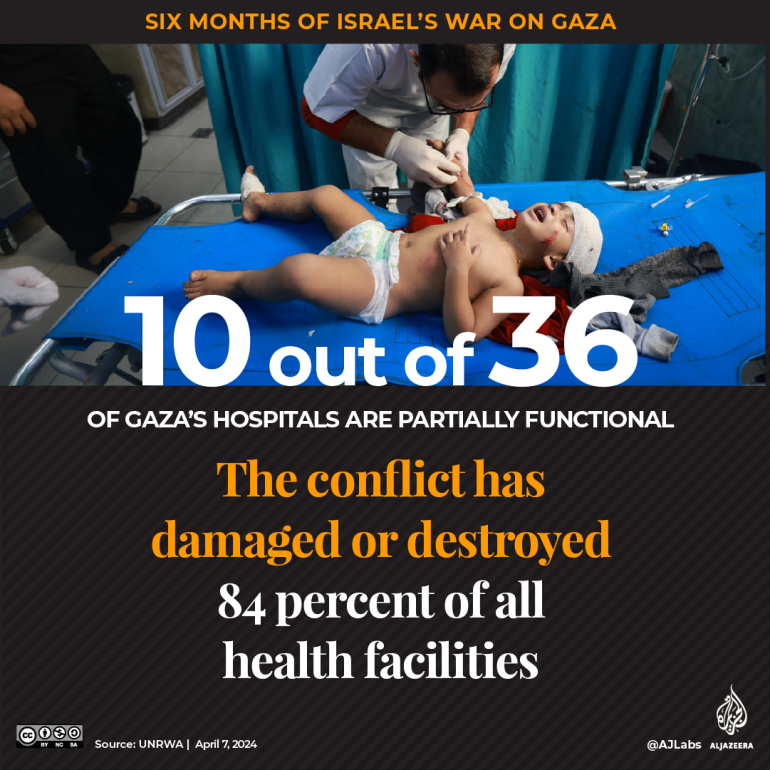
A two-week-long siege in and around al-Shifa Hospital, the largest in Gaza, left it heavily damaged and burned by last week. The Israeli army killed at least 400 people at the compound during its siege and arrested hundreds more.
An acute shortage of medicine, along with exhausted and starving healthcare professionals, means most patients are unable to receive treatment in Gaza. Many operations and amputations have had to be performed without anaesthetic.
How many journalists have been killed?
The Israeli army has killed the largest number of journalists of any modern conflict and detained more than 24.
On March 18, Al Jazeera correspondent Ismail al-Ghoul was arrested for 12 hours and beaten by Israeli forces in al-Shifa Hospital.
Before that, on January 7, Al Jazeera journalist Hamza Dahdouh, son of Gaza bureau chief Wael Dahdouh, was killed by an Israeli missile in Khan Younis. Hamza was in a vehicle near al-Mawasi with another journalist, Mustafa Thuraya, who was also killed in the attack.
On December 15, 2023, Al Jazeera cameraman Samer Abudaqa was hit in an Israeli drone attack that also injured Wael Dahdouh, in Khan Younis, Gaza.
Abudaqa bled to death over four hours as emergency workers were unable to reach him because the Israeli army would not let them.
The Committee to Protect Journalists puts the number of journalists killed at 90, with the Government Media Office in Gaza saying some 140 have been killed.
Last week, an Israeli strike targeted a journalists’ tent in the courtyard of the Al-Aqsa Martyrs Hospital, killing at least four people and wounding multiple journalists.
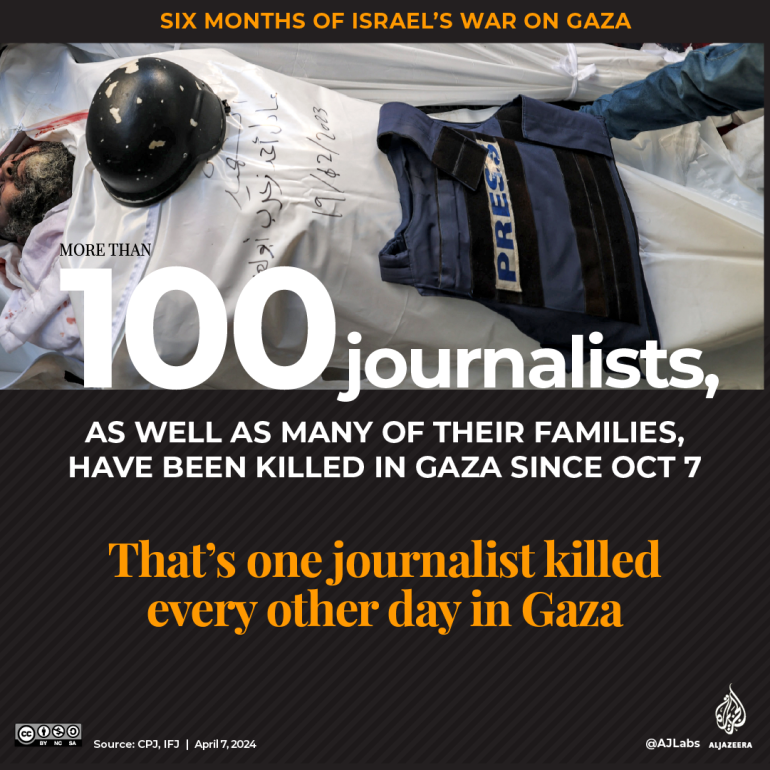
Related
Ashghal commences roads, infrastructure development in Birkat Al Awamer
Doha, Qatar: The Public Works Authority 'Ashghal' started the implementation of the Roads and Infrastructure Development Project in Birkat Al Awamer. T
India-Qatar trade agreement must be approached with caution: GTRI –…
India should tread cautiously on a potential free trade agreement (FTA
Qatar’s Ashgal likely to award industrial areas infra consultancy contract…
Qatar’s Public Works Authority (Ashghal) is expected to award the design and lead consultancy contract for the North of New Industrial Area Roads and Inf
Qatar’s $2.5bn green bonds fund enhances renewable energy and infrastructure
Doha, Qatar: Qatar continues to boost its investments in sustainable development, demonstrating its competitiveness on the global stage. An official no

